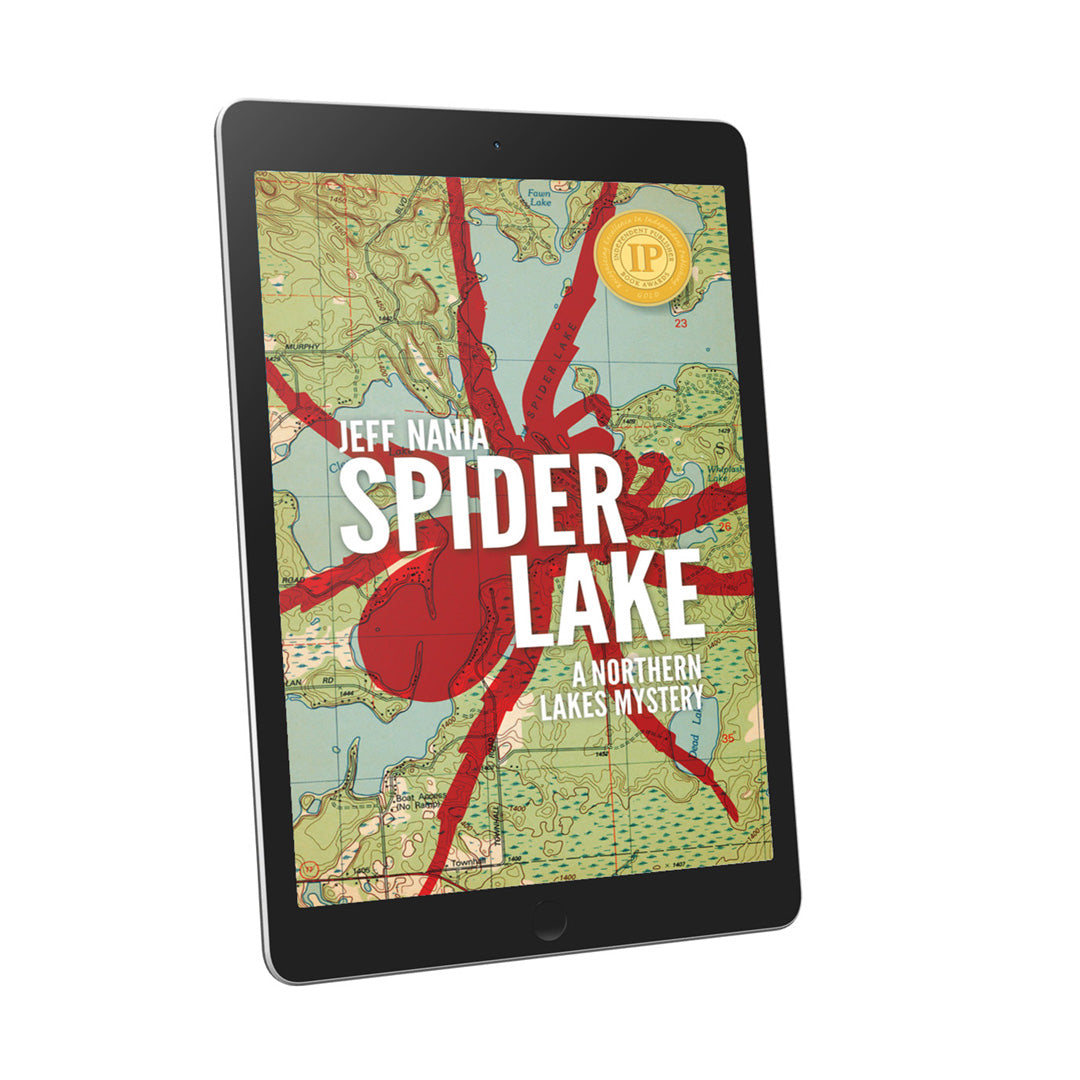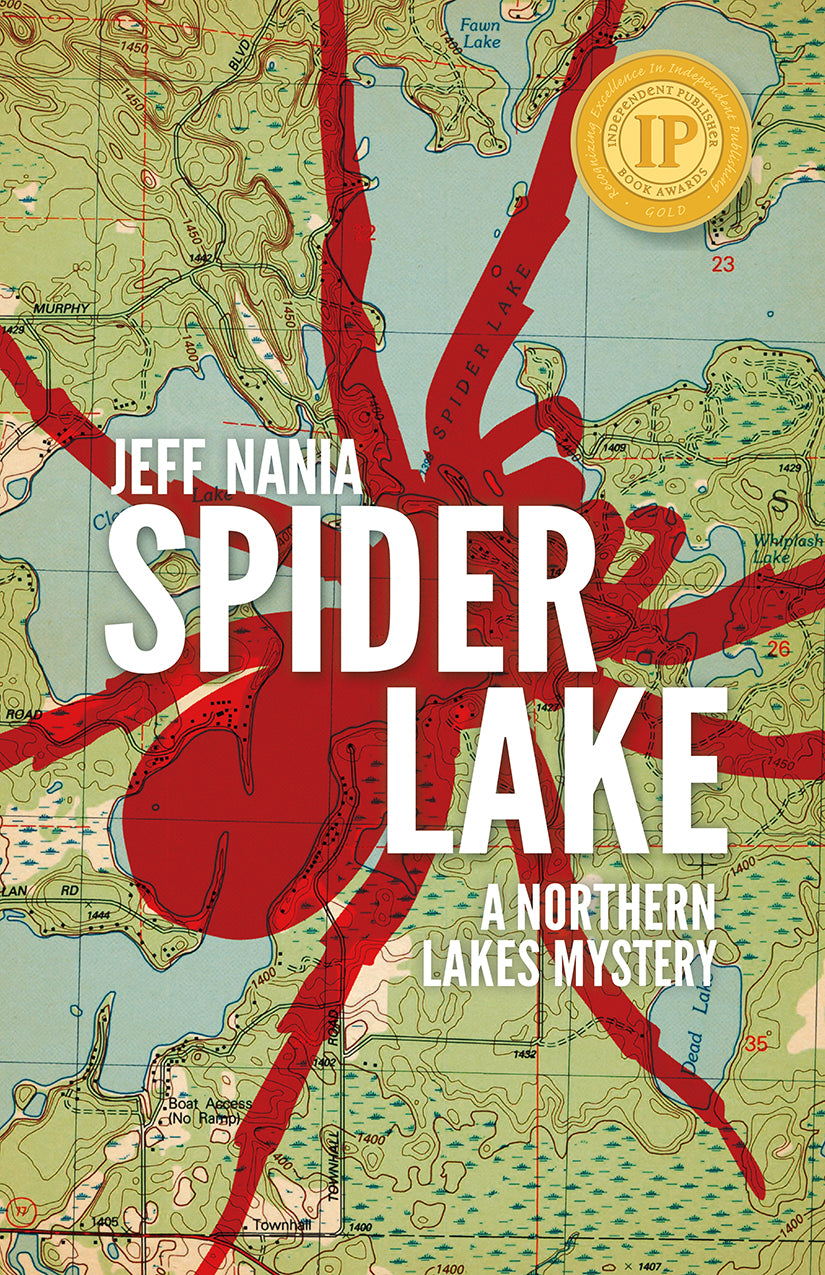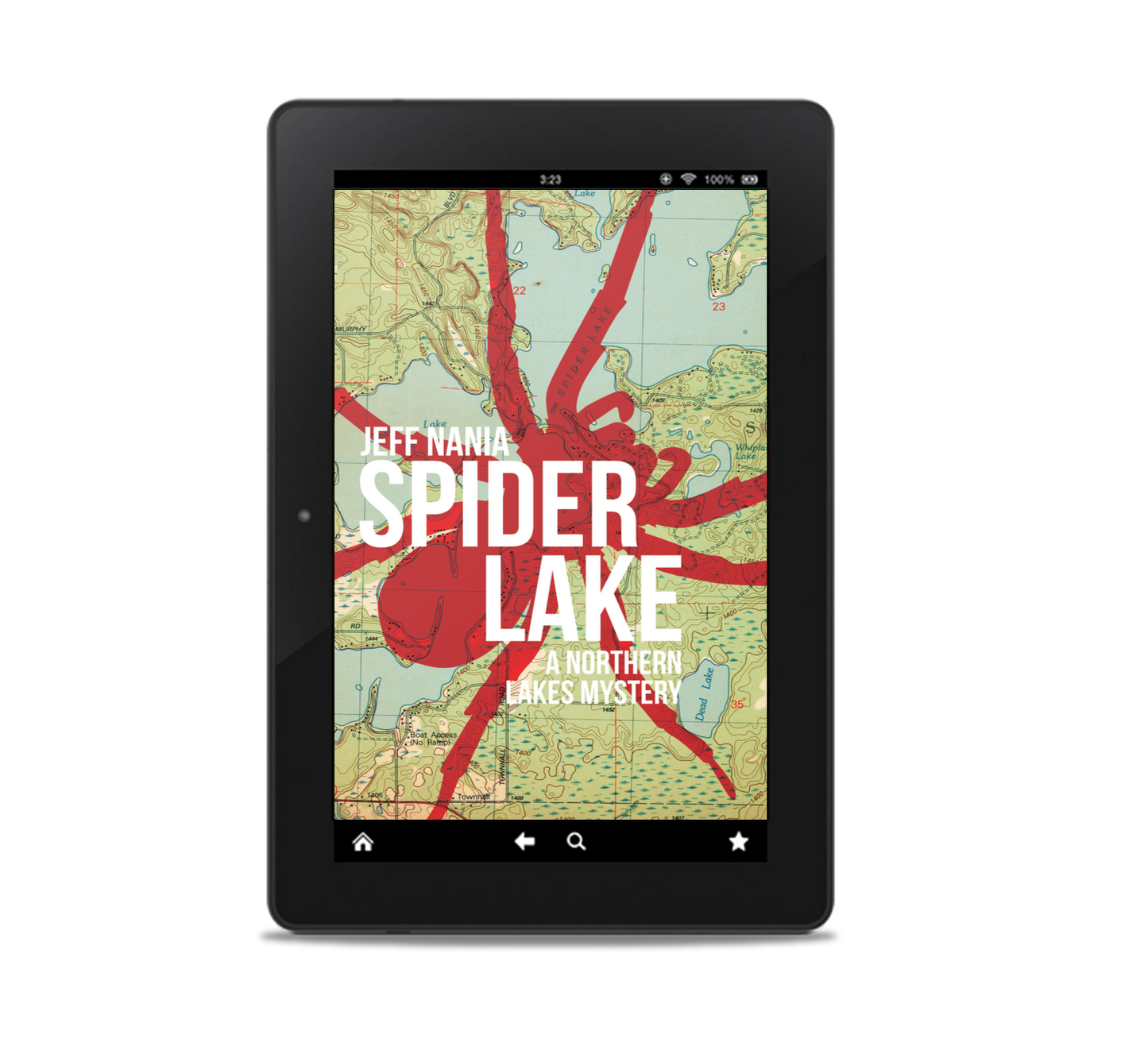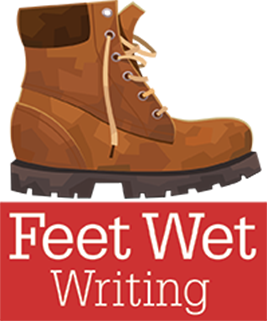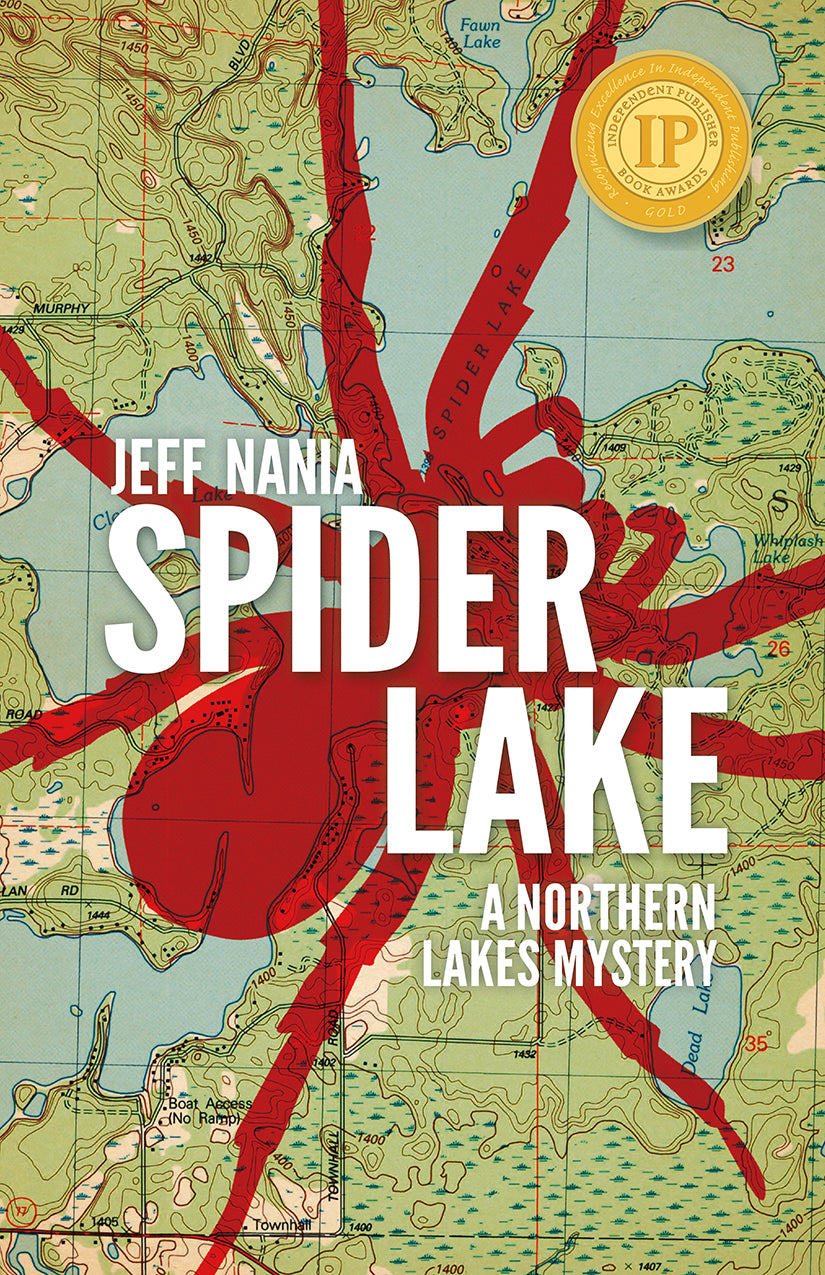Spider Lake
Spider Lake
Triple award-winning second book in series
⭐️⭐️⭐️⭐️⭐️ 565+ 5-Star Reviews
Couldn't load pickup availability
- Purchase the E-book/Audiobook
- Immediately Receive Email from Bookfunnel with Download Link
- Send to Preferred E-Reader and Enjoy
Print Books
- Purchase Paperback
- Receive confirmation of order
- Paperbacks are shipped within 2 business days!
Synopsis
Synopsis
A missing federal agent, suitcases full of cash, a secluded cabin in the woods. Spider Lake is no longer the peaceful retreat John Cabrelli needs to recover from his gunshot wounds and start a new life. Knowing Cabrelli is a former law enforcement officer, the new chief of police recruits him to help untangle a string of strange events in the little town of Musky Falls. Cabrelli and a colorful team of local residents land in the center of a fast-paced action thriller with a surprise ending that’s sure to make your head spin.
Former police officer John Cabrelli is recuperating at Spider Lake when a string of mysterious events in a nearby town draws him into a case involving a missing federal agent and a secluded cabin… An unputdownable crime thriller!
Deftly crafted, action driven, suspense thriller of a read with a unforeseen surprise ending.
— Midwest Book Review
Book 2 of the Northern Lakes Mystery Series
If you would like printed books inscribed, add the title to your cart, click on "view cart" and indicate to whom in the text field.
Chapter 1 Look Inside
Chapter 1 Look Inside
Life is one of the most squandered of all our natural resources. Who hasn’t wished a day, week, or month away? “Tough week—can’t wait until it’s over” or “Only five more years to retirement.” There’s a cure for that. In my case, getting shot and almost dying gave me a new appreciation for being alive.
I hope that I am never dumb enough to waste another minute, much less a day. It was with this attitude that I embraced the extensive physical therapy that was designed to literally get me back on my feet. Two rounds from a nine millimeter fired by a crooked cop had come close to putting an end to John Cabrelli. But as they say, “Close only counts in horseshoes and hand grenades.”
One round destroyed a kidney, the other lodged in my back near enough to my spinal cord to make wheeling myself around for the rest of my life a distinct possibility. There were long weeks of surgeries and treatments that included enough pain medication to make an elephant smile. During my time in the hospital, there was one thing that kept me going. I knew that I was going to get better, even when the doctors seemed doubtful. I heard what they said as they talked in hushed voices when they thought I was sleeping. I listened when they talked about me like I wasn’t there. Most often I heard concern and doubt, but they had come to know me and had learned not to underestimate my stubbornness, and they worked hard to help me. For me and all those people who stood by me, I promised myself that if I ever got out of the hospital, nothing would stop me. I had a life to live. Wheeling or walking, no dust was going to settle on ol’ John.
I couldn’t wait to get out of the city and return home to sit on my boat dock and look at Spider Lake, the most beautiful northern Wisconsin lake in existence. I longed to see and smell the Northwoods, swim in the cool, clear waters, and catch a keeper musky.
The road back had been a long one. I had been taken by helicopter from Musky Falls to Madison for emergency treatment and several surgeries. Once my condition had improved, I was allowed to return to Musky Falls and continue physical therapy at the local hospital. The therapists had been kind but firm, always pushing me to do better. Maybe it was the mental trauma that made my mind regress, but during the most intense parts of physical therapy, when I questioned my ability to get to the next level, one thing entered my mind: the story of the little engine saying, “I think I can, I think I can. Toot! Toot! I think I can.” Because of the little train and diligent, caring professionals, I started to improve. It was slow going, almost unnoticeable progress, but progress all the same. My walking had gone from a four-legged contraption preceding me everywhere I went to a stout wooden cane that had once belonged to my uncle Nick.
The cane was not your standard run-of-the-mill model. It was covered with relief images of a snake, eagle, fish, turtle, and bear. It was also sturdy enough to be an effective weapon if needed. Even though I was no longer a cop, the defender mindset never seemed to be far beneath the surface.
It had been a long winter, mostly spent reading by the fire and twice-daily trips to PT. I relished every moment of it, even when the outside thermometer read thirty-five below zero one morning. This dramatic winter weather made books read better, and there was always a pile of dry firewood in an old copper boiler by the woodstove.
One night a blizzard came in and left a foot or more of pristine white snow that covered everything—an ermine blanket undisturbed, except by the tracks of a couple of hungry deer that snuck up to eat out of the birdfeeder. Outside was a winter like only the north country knows; inside the fire kept me toasty warm. The view from the picture window was of a frozen Spider Lake, the wind unobstructed whipped the snow across the surface.
Time passed quickly because there was little room for much free thinking. The physical therapy, coupled with the recovery and healing of my wounds, was all I could handle. At night I fell into bed exhausted. Some nights I was so tired I even lapsed into a dreamless sleep. But most nights I shared with those whose lives had intertwined with mine; I had survived, they hadn’t. I relived the events night after night in torturous dreams—bizarre renditions of tragic events trying to change the outcome—waking up to the same realization that the past never changes. No matter how much you worry, how hard you pray, you cannot change what happened one minute ago. A perfectly rational person would understand this absolute truth and move on, spending that energy on the future. Unfortunately, many spend their entire lives shackled to the past, dragging along the burden of things they wish had gone differently. I am one so shackled. Even if those thoughts are lost during my waking hours, they come rushing back when I close my eyes.
The time also flew by because my life and the lives of those around me had changed. This change caused plenty of adjustments to be made—not only because of my injuries and recovery. It was more than that.
I had inherited a cabin in northern Wisconsin from my aunt Rose and uncle Nick, a place they named “Nirvana.” It had become my permanent home. I also had acquired a roommate, Julie Carlson, a local teacher who had been living there and helping around the house before Aunt Rose passed on and before Uncle Nick was murdered. She lived upstairs and I lived down. Julie was the possessor of a truly indomitable spirit. The first time we met, her striking blonde hair and blue eyes were obscured by the LC Smith double-barreled shotgun she was pointing at me. After being convinced that I didn’t need to be shot, she lowered the gun. Out of curiosity, I asked her if it was loaded. She looked at me like I was an idiot and said, “What good is a gun that’s not loaded?” Our relationship had now improved to the point that most of the time, I didn’t feel like she might change her mind and decide to shoot me after all.
When Julie picked me up in Madison after I was released from the hospital, I hadn’t considered the possibility that she intended to be my caretaker. I knew I would need help for the first few weeks but assumed I’d work that out once we got back to Spider Lake. Before I could even think about it, Julie announced her intentions. She said it in such a matter-of-fact tone that if I hadn’t been listening closely, I would have assumed I had already agreed to it.
But I was listening and strongly objected. I pointed out lots of reasons that sounded pretty good to me, ending with my bold proclamation, “End of discussion. Thank you, but no. I will hire a nurse from town.” It was at that point I first learned a lesson: the end of the discussion occurred when Julie Carlson decided, period.
“Are you done?” she quietly asked.
“For the moment,” I responded, “but I reserve the right to revisit the subject at any time.”
Then Julie delivered a succinct and pointed message, “John, you certainly have options. We could turn around, and I could drop you at an institutional aftercare facility in Madison where different nurses take rectal temperature readings to start each shift because the manual says they have to, and they wake you up to see if you’re sleeping. They’d probably take pretty good care of you while all the time thinking about where they would rather be. If you’re lucky, you may actually get a room that has a view of a parking lot. They may even take you outside once or twice a week. Then, of course, there is the food. Nothing like an institutional diet to bring you back to the picture of health. If that’s what you want, this car goes south as well as it goes north. I can turn around at the next exit.
“Or you could be in a beautiful cabin on a peaceful northern lake. The view out your window would be nature’s finest panorama, changing every day. Once you’re able, you can go outside anytime you want and sit on the dock, maybe drown some worms. When winter sets in, you can sit by the fire and read or simply sit for that matter. Until you can drive, Bud will take you into therapy in the morning, and I will take you in the afternoon. I promise drive-thru dining interspersed with home-cooked meals. I also promise you peace and quiet and rest that are likely as important as physical therapy. I will never come near you with a rectal thermometer. In the course of changing your dressings, inspecting your wounds, and helping you in and out of the shower, however, there are going to be instances where you will be forced to leave little of your physical self to the imagination. I will be respectful and allow you as much privacy as I can, but facts are facts, and there are going to be those moments. So get over it; I already have. Be glad that you have a beautiful place to go to.”
I didn’t say a word for the next fifty miles. While the unusual events we had been through together less than a year earlier caused us to forge a close bond, one that in the normal scheme of things would take years to develop, we barely knew each other. We certainly had not been on intimate terms. In truth, I have trouble accepting help from anyone, although support from friends was exactly what I needed.
“Okay, Julie. We’ll try it.” I finally said.
Share
